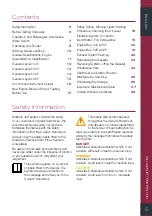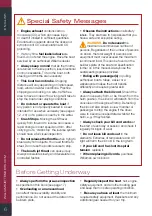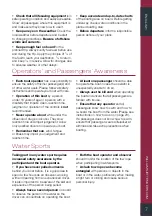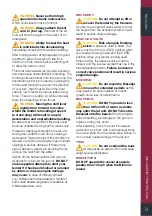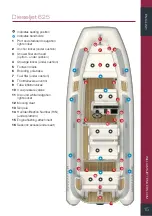
ENGLISH
6
WILLIAMSJETTENDERS.COM
•
Always perform the pre-use inspection
as specified in this book (see page 17).
•
Overloading or an uneven load
can affect manoeuvrability, stability and
performance. Do not exceed the data on the
builder’s plate.
•
Regularly inspect the boat
, hull, engine,
safety equipment, and all other boating gear
and keep them in safe operating condition.
•
Be sure you have at least
the minimum
required safety equipment, lifejackets and any
additional gear needed for your trip.
Before Getting Underway
ENGLISH
6
WILLIAMSJETTENDERS.COM
•
Engine exhaust
contains carbon
monoxide (CO), which can cause injury
or death if inhaled in sufficient quantities.
Educate all occupants about the risks and
symptoms of CO accumulation and CO
poisoning.
•
If at any time,
fuel leaks/odours
are
found, do not start the engine. Have the boat
serviced by an authorised Williams dealer.
•
Always keep in mind
that as the throttle
is returned to the idle position, less directional
control is available. To turn the boat, both
steering and throttle are necessary.
•
This boat has no brake
. Stopping
distance will vary depending on initial speed,
load, wind and water conditions. Practice
stopping and docking in a safe, traffic-free
area to have an idea of how long it will take to
stop the boat under varying conditions.
•
Do not start or operate the boat
if
any person is not properly seated in a seat
intended for use when underway (see pages
12 –16) or if a person is nearby in the water.
•
Crash Stops
. Moving the shift lever
quickly from forward to reverse can cause a
rapid change in boat speed and trim. After
carrying out a ‘crash stop’ the reverse system
should have a full visual inspection.
•
Do not release the throttle
when trying to
steer away from objects. You need throttle to
steer. Do not use the boat’s reverse to stop.
•
The boat’s jet thrust
can cause injury.
Always accelerate slowly, and decelerate in a
controlled fashion.
•
Observe the instructions
on all safety
labels. They are there to help assure that you
have a safe and enjoyable outing.
WARNING.
Do not exceed
the
maximum recommended number of
persons. Regardless of the number of persons
on board, the total weight of persons and
equipment must never exceed the maximum
recommend load. This can be found on the
builder’s plate of the boat and specification
further on in this manual. Always use the
seats/seating spaces provided.
•
Riding with passenger(s)
or pulling
authorised boats, tubes, a skier or a
wakeboarder makes the boat handle
differently and requires greater skill.
•
Always attach the kill cord
. Should the
driver move away from, or be thrown from the
helm position, the kill cord will detach from the
console and the engine will stop. Detaching
the kill cord also allows a crew member or
passenger to stop the engine if the driver
were to become incapacitated whilst at the
helm, e.g. if they fainted.
•
Always check your kill cord works
at
the start of each day or session and check it
regularly for signs of wear.
•
Do not leave kill cords out
in the
elements. Extremes of temperature and UV
light will harm the kill cord in the long term.
•
If your kill cord has lost its spiral
tension
, replace it.
•
When replacing kill cords
, purchase
Williams’s own kill cord.
Special Safety Messages
Summary of Contents for DIESELJET
Page 3: ...OWNER S HANDBOOK ...





